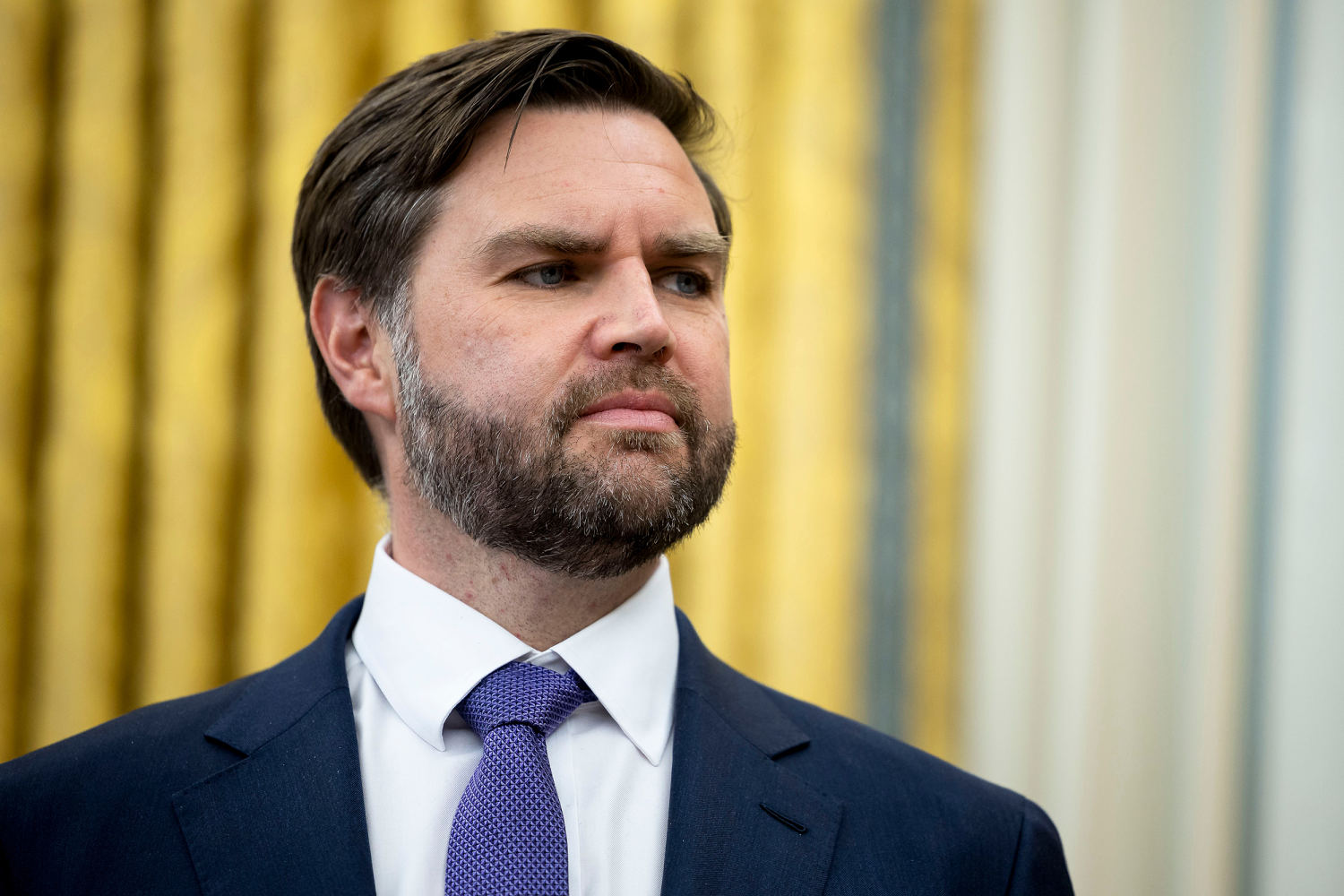Share this @internewscast.com

WASHINGTON — Vice President JD Vance’s last-minute concerns about President Donald Trump’s decision to strike the Houthis in Yemen, raised in a now-public Signal chat with other top U.S. officials, have left senior Republican lawmakers angry.
Some are upset because they think Vance was trying to block a directive from Trump. Others, reflecting a broader debate inside the administration and the GOP over the wisdom of embarking on a stepped-up campaign against the militant group, are upset about the side he took.
Trump has campaigned and governed on the idea that America should be put first and its traditional allies and conflicts overseas second. But his administration is now making moves that reflect the potential for a protracted military campaign against the Houthis.
Observers say the debate over the Yemen strikes is the difference between MAGA world, which tends to be against helping the Europeans while focusing on Asia, and garden-variety Republicans, who think the U.S. should not abandon issues in the Middle East.
The Pentagon has moved an additional aircraft carrier and its attendant ships into the region, joining the USS Harry Truman carrier strike group already there. Defense Secretary Pete Hegseth has authorized at least two Patriot missile defense batteries from Asia to be moved to the Middle East, two U.S. officials and one defense official told NBC News.
And in a move that suggests thoughts of a sustained campaign in the Middle East, NBC News has also learned from one U.S. official and another person familiar with the matter that defense officials have approved the relocation of a large missile system known as a Terminal High Altitude Area Defense, or THAAD, a more complex effort.
At the same time, the military has acknowledged in a statement that it quietly moved multiple B-2 bombers, C-17 cargo jets and KC-135 refueling tankers to Diego Garcia, a tiny island in the Indian Ocean that has been used as a hub for operations in the Middle East in the past. The B-2 bombers can carry the largest bombs in the U.S. arsenal, including bunker buster bombs that could be useful against Houthi militants, who are known to bury sites deep into the ground to protect them.
All of these moves signal a commitment to a sustained fight against the Houthis with the purpose of finally neutralizing the group, which is armed by Iran and has caused havoc to shipping routes through the Red Sea, and potentially deterring Tehran.
Many Republicans on Capitol Hill are generally happy to see the Trump administration take the fight to the Houthis.
Vance’s office did not immediately respond to messages seeking comment.
Questioning Trump?
The fact that Vance had questioned Trump’s directive to conduct the strikes has largely been lost in the controversy over top administration officials discussing the military plans over Signal, and the inadvertent inclusion of The Atlantic’s editor-in-chief in that chat.
Taking what some believe is a pro-MAGA, anti-European position, Vance argued in the discussion on Signal that with the strikes, the U.S. was doing the work of European freeloaders, since, he said, the lion’s share of Red Sea shipping is attributed to their economies.
That has angered some Republicans who believe Vance was about to obstruct the president’s wishes in a way they see as comparable to how some top Trump aides acted during his first administration.
“I think we are making a mistake,” Vance wrote in the Signal chat, later published by The Atlantic. Vance argued that although Trump wanted to send a message with the strikes, “I am not sure the president is aware how inconsistent this is with his message on Europe right now.” He did say, though, that he was “willing to support the consensus of the team and keep these concerns to myself,” but went on to say “there is a strong argument for delaying this a month.”
Minutes later, White House Deputy Chief of Staff Stephen Miller shut down the conversation, writing, “As I heard it, the president was clear.”
Vance’s questioning of the move on the Signal chat, which did not include Trump, has angered hawkish Republicans who were frustrated with what they felt were the Biden administration’s muted efforts to go after the Houthis and who celebrate Trump’s intention to go after senior leaders.
“Capitol Hill Republicans still have their jaws on their floor with how actively the VP worked to try and undo a Trump decision,” one senior Republican official on Capitol Hill said in a text. “Thank goodness Miller stepped in and put him in his place.”
The senior Republican official added: “It’s one thing to have a healthy interagency debate before a decision is made. It’s another to try and undo a Commander-in-Chief decision once Trump gives the execute order. This is the latter, and it’s very [John] Bolton-esque.”
Some Republicans believe Vance raising questions about an action the president had already agreed to amounted to a form of obstruction, the same senior Republican official said.
“The president was not aware how inconsistent this is with his own messaging?” another Republican on Capitol Hill asked, quoting Vance. “These are the president’s policies, and for JD Vance to question them like that is ridiculous. He is the commander in chief.”
Fears of another Iraq
But some Trump administration officials believe privately that the U.S. should wash its hands of the conflict and move on. They worry that if he doesn’t, Trump could get himself mired in a campaign that will prevent him from extracting the U.S. from the Middle East’s problems, according to one current administration official, who asked not to be named because they are not authorized to speak to the press.
“It’s 2002 all over again,” the official said, referring to the lead-up to the 2003 invasion of Iraq.
Dana Stroul, who was the top policy official in the Pentagon for the Middle East under Biden and is now a senior fellow at the Washington Institute for Near East Policy, said, “I think Yemen will be the first test case of these opposing ideological positions in the Trump administration. This is the beginning of a campaign, and for the campaign to be successful, you need to be prepared to go for months if not longer.”
After Trump pours resources into the region, it will be difficult to pull them back out again, she said.
“When the president realizes months from now how tied down he is in the region, he might be frustrated to learn it is difficult to quickly change course without tremendous risk.”
Biden was often criticized by both Senate and House Republicans for being overly careful when it came to targeting the Houthis, but Stroul said the Biden administration’s strategy was to keep a lid on the Houthis without getting pulled in altogether.
Gen. Michael Erik Kurilla, the commander of U.S. Central Command, presented strike packages to the Pentagon several times last year that included targeting Houthi leaders, specifically those involved in the militants’ drone and missile program, according to multiple current and former U.S. officials.
“The Biden White House wasn’t approving targets even when they had solid intel with multiple U.S. agencies and allies backing up the info, specifically when they include targeting people,” said a former U.S. official with knowledge of the operations.
But two former U.S. officials, who worked in the White House during the Biden administration, said some of Kurilla’s plans were not approved because they weren’t based on solid intelligence, the possibility of civilian casualties was high, and Kurilla was consistently prepared to accept higher risk than the Pentagon and White House. The two former U.S. officials said obtaining actionable intelligence was hard because the U.S. lacked sources on the ground and drones were often jammed or shot down.
Still, there was no “knee-jerk opposition” to targeting Houthi leaders, one of the former U.S. officials said.
Representatives for Kurilla did not respond to a request for comment.
Things changed in January 2025, when the combination of good intelligence shared by Israel and stepped-up intelligence by the U.S. put Washington in a better position to strike the Houthis, the two former U.S. officials said. They said Biden administration officials believed that they could have acted at that point, but that executing the plan correctly would have taken months and would have meant starting an operation just before Inauguration Day and boxing in the Trump administration. So Biden administration officials essentially bequeathed the plan to the Trump administration, which is now beginning to execute it.
Defense Department officials say the strikes in Yemen will continue. “This is a sustained, ongoing operation targeting Houthi leadership,” a defense official said in a statement. “At the direction of the president, CENTCOM continues to conduct strikes across multiple Iran-backed Houthi locations every day and night to restore freedom of navigation and restore American deterrence.”

















